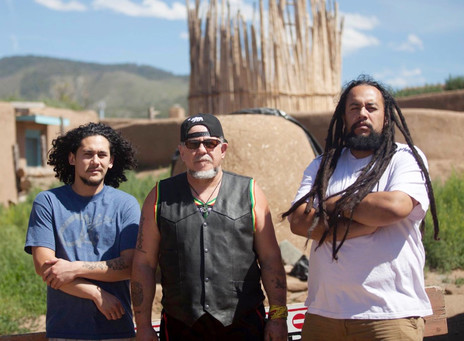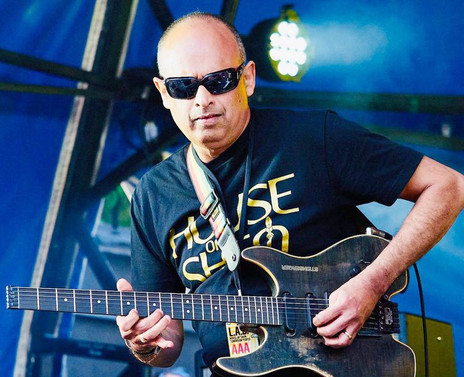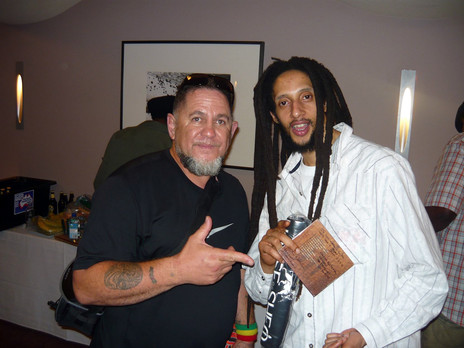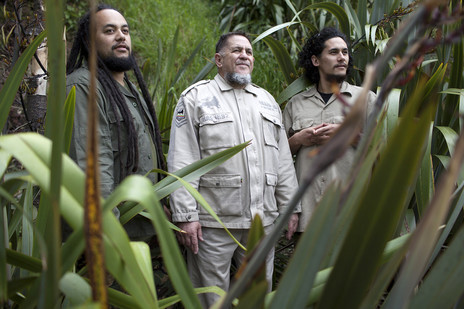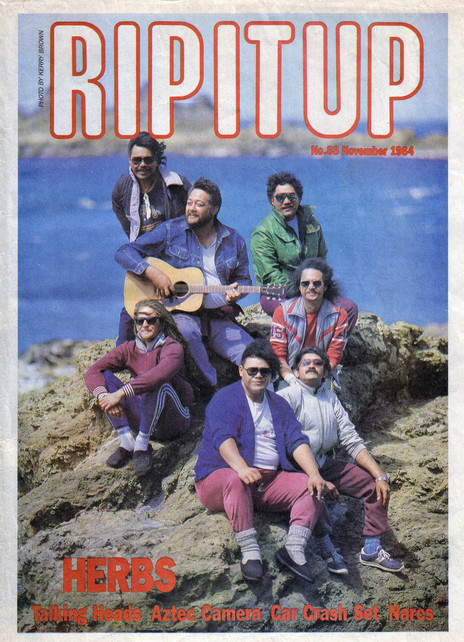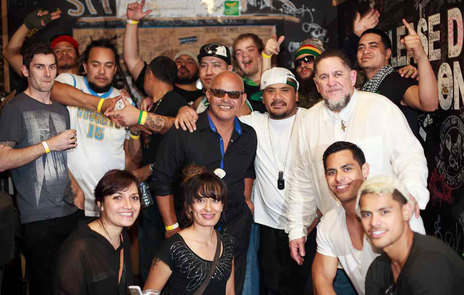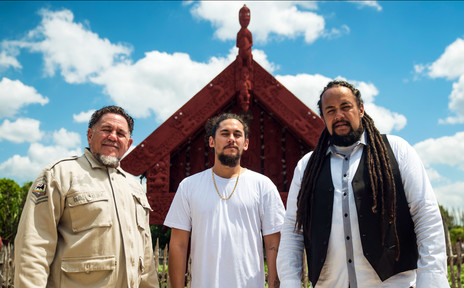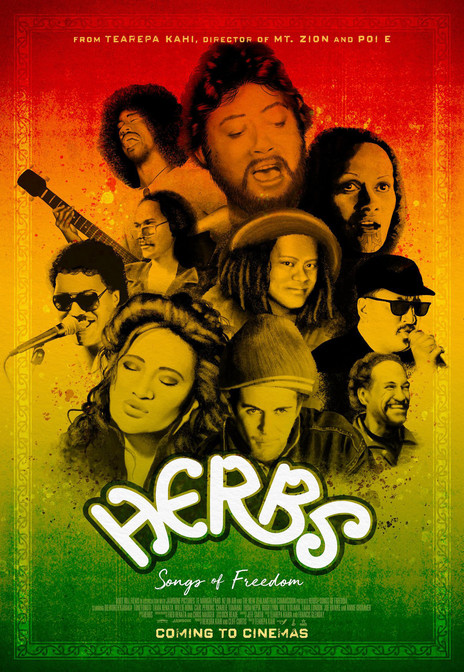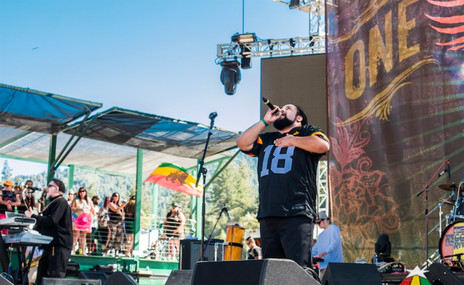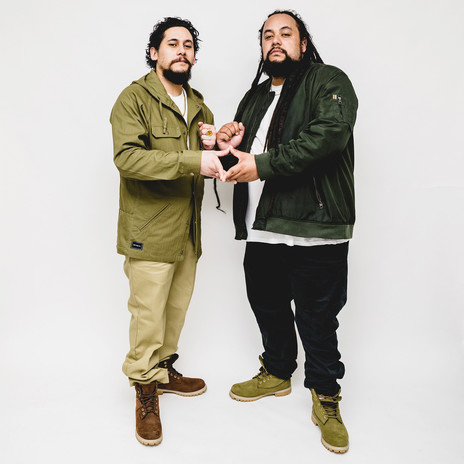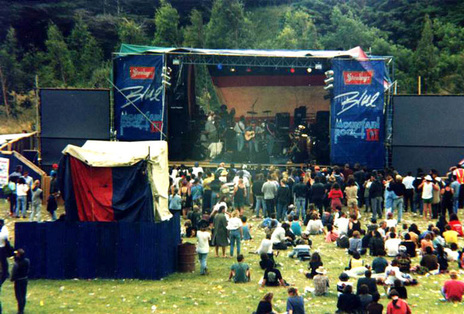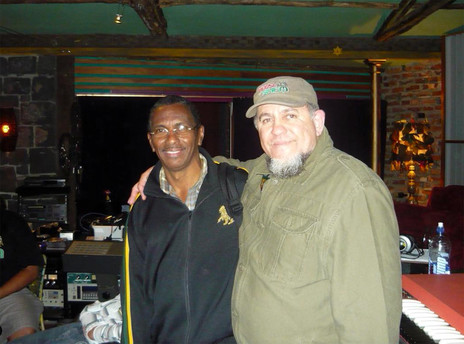Carl Perkins’ first serious involvement in the local music scene was as part of the band Blue Image, which also featured his brother and sister. Throughout the late 1970s, he was involved with a number of groups, including playing drums with The Hi-Marks showband, helping to shape the Aotearoa reggae band Herbs, and performing with Whanganui group Dread. By the 1980s, he was in New Plymouth leading his own group, Uprising.
In the early 80s, Uprising was touring as a support act for Herbs when the headliners told Perkins they were looking for a percussionist. He offered his services and took the place of founding member Toni Fonoti.
Herbs member Dilworth Karaka later told Māori Television, “He brought some great ideas with him. You have to remember that we were one of the first homegrown reggae bands in New Zealand, so the music had to have power. Not only in career had he chosen that, but in his personal life as well.”
Perkins joined Herbs in 1982 during the Light of the Pacific album and tour. He wrote songs on their 1984 album Long Ago, including ‘Jah Reggae’ and ‘Stolen Time’ and co-wrote others. The band performed in Tahiti and Australia, as well as playing at the Hong Kong Asia Pacific Arts Festival. His final show with the group was supporting Tina Turner in December 1985.
In 1987, he formed a new group, Mana, with Kaikau Langi and another former Herbs member, Jack Allen. They’d been going less than a year when they scored a slot supporting The Wailers at the Logan Campbell Centre in Auckland. After this, they moved quickly to record the Ain’t Gonna Stop EP and released the title track as a single. In 1990 Mana supported Toots and the Maytals. By this stage the band included another Herbs musician, Spencer Fusimalohi, alongside keyboardist John “Dready Dan” Henare and drummer Taina Winau.
When Mana came to release their self-titled album in 1993, it was promoted by a lead single that was a cover of a Herbs song written by Fusimalohi, ‘Jah’s Son’. The video was filmed at Ōtara Markets by Stuart Page (director) and Rewa Harré (cameraman). The album was nominated for Best Pacific Album at that year’s music awards, but the group came to an end in 1994 and Perkins had to find a new way forward.
Perkins played percussion with the 12 Tribes of Israel band throughout the 80s before joining them officially in 1989, playing with them when they supported Judy Mowatt and recording on their 1990 album Shine On. He also performed as percussionist with legendary guitarist Billy TK and recorded on the Simon & Fire album United States of Africa (1994).
House of Shem
While Perkins took a deep interest in Rastafarianism as a cultural and political movement, his religious roots always remained in the Rātana church. His grandfather and family were strong followers of the faith and his father was given his name 'Pa O Te Omeka' by the founder, Tahupōtiki Wiremu Rātana.
In 1995, Perkins returned to the Rātana Pā (near Whanganui) and become a Akonga (Learning Disciple) with the Rātana church (near Whanganui). By 2001 he had formed Southgate Entertainment and Morehu Music Publishing – a record label and publishing company he self-funded to help local and international aspiring youth.
When he first returned to Whanganui, he also played in Hakiwaa with Ruia and Ranea Aperahama (both had been members of Southside of Bombay). Following this, he formed a new group in 1997, choosing the name "Shem" from the old testament.
“Shem was the son of Noah, and he was the one who went towards the Middle East ... where we see ourselves coming from.”
“Shem was the son of Noah,” Perkins’ son Te Omeka explains, “and he was the one who went towards the Middle East, so that is where we see ourselves coming from. Whereas after Ham was Cush so his line was in Africa and Japheth [another son of Noah] went to Europe when they went their separate ways. I think Dad just chose that name because it was easier than saying House of Māori. He went back before our culture and chose that.”
Perkins and his wife Denise had five sons in all, with Isaiah becoming the first to play music with them when he sang backing vocals in 2000 for House of Shem at age 11. Within a few years, Isaiah was taking lead parts and gradually most of his other brothers became involved too.
“Dad never forced the music onto us,” says Te Omeka, “we just wanted to do it. It was a bit different back then too because reggae wasn't really the biggest when I was in college around 1999, but we just started playing. Everyone knew me as being in a band. It wasn’t that big but we just kept going.”
The band name was changed to House of Shem and the group issued their first releases in the mid 00s. ‘Keep Rising’ appeared on the Loop compilation, The Green Room: Whānau. The song was written by Carl and Te Omeka, who also played bass on the track. Three of the other brothers also featured – Isaiah on keyboards/BVs, Joshua on drums, and Hamuera (Sam) on percussion. Carl moved from bass to rhythm guitar and the only non-family member was lead guitarist Benny Koroheke. Their music featured on the popular Conscious Roots series of compilation albums.
House of Shem built a following through the hard mahi of continuous touring throughout Aotearoa, with Carl Perkins’ reputation making it possible to play shows in small towns that other emerging groups might overlook. As the group’s ambitions became more serious, the family members in the band were whittled down to just Carl, Te Omeka, and Isaiah, with the trio sharing the songwriting between them. Joshua stayed in the band long enough to record drums for the songs ‘What About the Children’ and ‘Dreams’.
As they moved towards recording their debut album, the line-up was filled out by a trio of highly experienced local musicians – guitarist Roy Venkataraman (who had toured with The Wailers), bassist Francis Harawira (T.T.I. Band and Token Village), saxophonist/trumpeter Chris Nielson (Rodger Fox Band, Gahu, Soulahula, Jive Bombers), and drummer Kaya Webster (who played with the 12 Tribes Band from primary school age).
Keep Rising (2008) dipped into the Top 40 upon its release, but its real success was over the long term with the album being certified gold a few years later. The first two singles became signature tunes for the group, which would later accumulate massive streams online. ‘Keep Rising’ surpassed five million streams, while ‘Thinking About You’ would amass a staggering 13 million streams (and counting).
The album was held together as a whole by the solid skanking groove of the band and the conscious themes in the lyrics, which drew from Rātana beliefs and Rastafarian teachings. They also allowed ‘What About The Children’ to be included on the charity album, Merry Christmas Baby, which directed all profits to Plunket.
Keep Rising
House of Shem were a very popular live act by this stage and became regulars at local reggae festivals, starting with the very first Raggamuffin event in Rotorua in 2008. The next year they played the Tribal Roots festival and took their first trip to Australia, playing a packed out show in Brisbane.
Their touring stepped up to a new level in 2010 when they were not only asked to play Raggamuffin in Rotorua, but the entire run of festival shows, which took them to Sydney, Perth, Melbourne, and Brisbane.
Touring Australia with Shaggy, Julian Marley, and Lauren Hill was an “amazing experience.”
Te Omeka recalls it was an amazing experience: “We were on tour with Shaggy, Julian Marley, and Lauren Hill. We were there as a support artist, but our main thing was that we insisted on staying in the same hotels as all of them and travelling in the same buses or on the same planes. That was how Dad was. He said ‘we’ll take this opportunity, so you can get to see how it’s done.’ He already knew, but he wanted to give us that experience of waking up every morning and see all these fellas in action and see how they do their touring.
“Each town we’d be walking around with these guys, who we’d been watching since we were little kids. Just going to a club and Julian Marley is sitting behind you, talking as normal. We were going to one of the shows and Robbie Shakespeare [Sly and Robbie] was sitting behind us in the van. We were saying ‘where is our bass player?’ and he leans over and says ‘I’ll play for you.’ We laughed so hard! Stuff like that – sitting with those fellas and finding that they’re just down-to-earth people.”
The band returned to do their own headlining shows in Australia later in the year, as well as a trip to New Caledonia and extensive touring at home (which included their first slot at Womad). Their progress was almost derailed when Carl Perkins was injured in an accident – the driver of their airport shuttle was texting while driving and ran a red light, causing a car crash that badly injured Carl’s leg. Fortunately he was able to continue, though it was an injury that would plague him for many years afterward.
House of Shem now had an impressive live following, but needed their second album to make good on the foundation they had built. They booked Aotearoa’s top studio Roundhead and brought over Jamaican sound engineer/producer Errol Brown to work with them.
“He was Bob Marley’s engineer,” says Te Omeka. “He came down and then took it back to Jamaica and mixed it at Tuff Gong. He brought the frequencies we were missing. We grew up on roots reggae and we were just trying to get that sound. We thought, we’ve got to make this happen. We’ve got to live with this, so we’ve got to do it right. So he came down for a few weeks and it was like – wow. Beautiful for him to come down and do that for us. He was the one who recorded ‘Buffalo Soldier’ and all those big hits of Bob’s.”
This investment of time and money was rewarded when Island Vibration (2011) became the first local roots reggae album to debut at No.1 on the charts. It would eventually reach gold sales. Its success was driven by live favourite ‘Party’, uplifting track ‘Just Remember’, and Isaiah’s heartfelt love song, ‘Sweet Love.’ It also included a track in te reo Māori ‘Tahuri Mai Ra’, sung by Perkin's former bandmate Ruia Aperahama.
International Reggae Stars
House of Shem followed the release of Island Vibration with regular gigging throughout Aotearoa and Australia, as well as making their first forays to the US.
“The first show we did in Hawaii was at the Waikiki Shell,” says Te Omeka, “right in the middle of Honolulu and it was sold out, so that was a bit of a highlight for us.”
They also played at the Sierra Nevada World Music Festival in 2012. Their international focus was also shown by the first single that preceded their third album – ‘Hard Road’ was a collaboration with US group Big Mountain. They brought Errol Brown back to work on some of the other tracks for the album. Harmony (2013) followed its predecessors in reaching the Top 40, driven by songs such as ‘Take You There’ which had a music video shot in Hawaii and ‘Let It Be’ which would become their most popular song on YouTube (nearing four million views). They had previously recorded the Beatles cover for Hemp, an album of reggae tributes to the Fab Four which included Ali Campbell (UB40), Sly & Robbie, Steel Pulse, and the Mad Professor.
‘Let It Be’ became their most popular song on YouTube, nearing four million views by 2023.
The album was distributed in the US and Europe by VPAL Music and it led to an eight-date tour of the US in 2014. This coincided with a new single track ‘She’s Mine,’ which managed to reach No.2 on the weekly Top 5 of popular Hawaiian station KCCN.
House of Shem’s overseas efforts in 2015 were even more impressive with a six-date tour of Australia in March and dozens of dates across the US (from April to July), including the Island Reggae Festival in San José, California, the Reggae In The Hills festival in northern California, and the Ska Reggae festival in Canada. Then in August they took off for another 12 dates across Australia and Aotearoa, co-headlining with Jamaican singer Anthony B. They rounded off the year with another run of shows in Aotearoa, leading up to the One Love Festival in February.
The following year was equally busy with another tour of the US and countless shows throughout Australasia (and one in the Philippines). Their latest single ‘Anything You Asked For’ proved their enduring success by passing over six million streams.
Clearly the band had reached the top echelon of the local reggae scene, but they were about to receive news that would turn their world on its head. Three days short of Carl’s 58th birthday on 18 February, he was informed that he had inoperable bowel cancer. He was given only months to live, but his tenacity meant he survived another 15 months. He played the next few shows which were already booked, before announcing the news publicly in March with a Givealittle page set up to support the costs of his care.
Remarkably, a few months later Carl was back touring. In November they played two dates supporting UB40, which renewed an old connection since he had toured with them in his days with Herbs and House of Shem had played with Ali Campbell at a festival in Hawaii in 2013 and with UB40 at Raggamuffin in 2014.
Despite increasing pain, Carl continued playing festivals (One Love in February 2018), taking part in studio recordings, shooting music videos (‘Peace and Love’), and appearing on radio/television for interviews. His last live performance was on 28 February in Auckland, by which stage his illness required hospital care.
Finally in May 2018, Carl lost his battle with cancer. His funeral was held at Raetihi Marae and drew hundreds of friends, family, and fans who had been moved by his music. House of Shem put on a tribute show at The Studio in Auckland which drew in over 700 people and had support slots from Herbs, Southside of Bombay, 12 Tribes of Israel band, Che Fu, Ria Hall, and Maaka. They also undertook a tribute tour with a dozen dates across Aotearoa and almost as many in Australia too.
It was clear from the way Carl lived his life that he would have wanted the band to continue after his death and so his two sons took the reins.
Te Omeka: “I guess we just had to keep pushing on. All of us were singers in the band. With some groups, with the lead singer gone it’s not the same any more. For us, it was easier because we all wrote the songs. Fortunately Isaiah has a similar voice so we can still do Dad’s songs.”
For the time being, the decision was made to put aside the album they had been working on and just release a run of singles – ‘Number 1’ (2018) and the concurrently released ‘Overtime,’ and ‘Te Whetu Marama’ (2019). They also went back to their very busy life on the touring circuit, though with some interruptions caused by the Covid-19 pandemic.
In 2021 it was announced that the new UB40 album would feature three songs written in collaboration with House of Shem.
The most surprising news came in 2021 when it was announced that the new UB40 album would feature three songs written in collaboration with House of Shem. The album saw UB40 revisiting the approach they’d taken on Baggariddim (1985), in which they invited collaborators to write new songs over backing tracks from songs off their previous albums. They wanted to take a collaborative approach again, so reached out to musicians across the world to gather tracks for Bigga Baggariddim (2021).
Most acts supplied a song each, but House of Shem sent in three tracks – ‘Good Vibes Tonight’, ‘Love You Now’, and ‘Message of Love’ – and the members of UB40 liked them so much that they used all of them. Even better, ‘Message of Love’ was chosen as a single for the album. The music video had the heart-warming feature of showing Carl singing his vocal part in the House of Shem studio, while Isaiah and Te Omeka travelled through the beautiful surrounding landscape.
UB40 guitarist Robin Campbell explained in the press release for the single that House of Shem were an obvious choice, due to their connection with Carl Perkins.
“He was in Herbs, which was the first reggae band of any note in New Zealand. I remember the first time we went there in 1981, they met us at the airport with a big bag of weed. They were good as their name! Then after Carl formed House Of Shem, they toured with us regularly because they’re a great band. I get quite emotional when I listen to this track. This was literally Carl’s last-ever recording, and he was such a lovely man.”
House of Shem continued to contribute to the future of local reggae music too and so they appeared on the debut single ‘Place to Be’ by new act, People of the Pa. They also began working towards putting out a compilation of the House of Shem singles up to this point.
Meanwhile Te Omeka and Isaiah’s own children were beginning to show signs that they too might continue the family’s musical tradition. Te Omeka particularly noticed the passion for music in his son, Shem.
“Shem has always been wanting to play music, but my dad always pushed us to get an education first. I didn’t actually know Shem could play at all. He was always coming to our rehearsals and lying by the kick drum. I’d be like – ‘what’s this fella up to?’ I’d bought them little toy drumkits so they could bang on them, but when he was just four years old he just jumped up at rehearsal and asked for a turn on the drums. I just recorded him and he played a whole song. I was like – oh man!”
In the years since, Shem and his brother Arepa – who is only four years older, and a competent bass player – have been filmed playing together and received tens of thousands of views on YouTube. Not to be outdone, Isaiah’s son played his first show on drums with House of Shem in 2022 (despite being only five years old at the time). Te Omeka sees this as a continuation of a love of music that goes back generations.
“My dad had grown up in a musical family from the start. His uncles were all musicians and singers – the McDonnell family. My grandad had a band with them, my dad’s dad. They were all musicians. When we look back in our family history, the Perkins family had a whole orchestra back in England. It goes way back to them. It was called the Perkins Family Orchestra. You could fill a whole book with the musical legacy of this family. It’s pretty crazy.”
